
About the Author: Sunday Sermons from Sell Chapel are written by Rev. Preston Van Deursen, Director of Pastoral Care at the Masonic Village at Elizabethtown.
Sometime ago, there was a Peanuts cartoon in which Lucy is in the outfield playing a baseball game. Of course, Charlie Brown is on the mound pitching. Lucy calls out to him, “Hey, Manager! Ask your catcher if he still loves me!” Charlie Brown interrupts his pitching and says to the catcher, “She wants to know if you still love her.” Then, in the next frame, he turns to Lucy and yells to Lucy, “He says, No!'” Then Lucy wants to know why not. He relays the information to Lucy again: “He says there are so many reasons he can’t remember them all.”
This upsets Lucy, and she responds, “Really? That’s very depressing.” Finally, Charlie Brown, exasperated, cries out, “Do you mind if we get on with the game?” Lucy’s response is, “Game? What game?” “The baseball game!” shouts Charlie Brown, to which Lucy responds, “Oh, that’s right. I was wondering why I was standing out here.”
Lucy brings up a good question. “Why we are standing out here.” What is our purpose? Why are we here?
This morning we want to focus on a piece of good news from Paul’s letters to the Ephesians. I am reading Ephesians 1:3-6: “Blessed be the God and Father of our Lord Jesus Christ, who has blessed us in Christ with every spiritual blessing in the heavenly places, even as he chose us in him before the foundation of the world, that we should be holy and blameless before him. He destined us to be his sons and daughters through Jesus Christ, according to the purpose of his will, to the praise of his glorious grace which he freely bestowed on us in the Beloved.”)
Paul is speaking here of our destiny. He says to us that we are destined to be God’s sons and daughters through Jesus Christ.
Do you believe in destiny? Do you believe you were put on this earth for a purpose? Do you believe that written into your very genes is an ideal script for your life? And if you do believe there is a purpose for your life, do you believe that you have found it?
Some people have a very strong sense of destiny.
That’s the first thing we need to see. There are people who believe that God has a plan for their lives and they seek to live out that plan. They trust God with their lives. They believe that all. things do work for the good for those who love God and they look for evidences of God’s providence in every aspect of their lives.
Dennis and Barbara Rainey in their book, Moments Together for Couples, tell about one such person. She was a British missionary named Elizabeth Aleward. Miss Aleward had two great sorrows as a young girl. The first one was that her hair was black and straight (when all of the popular girls had a head full of golden curls), and the second one was that while all her friends kept growing, she ended up short.
Years later, God called Elizabeth Aleward to the mission field in China. As she stood looking at the people to whom God had called her to minister, two things became apparent to her. First, each and every one of them had long, straight, black hair. And, secondly, each and every one of them had stopped growing at exactly the same moment she did. She said she bowed her head and prayed, “Jehovah, God, You know what You are doing!” Elizabeth Aleward believed in destiny. She believed she was where God meant for her to be.
Corrie ten Boom was a modern-day saint. She had that same sense of destiny even though she had spent a very painful time in a Nazi concentration camp and lost her sister in that camp. After World War II, Corrie Ten Boom traveled around the world and spoke of her war experiences in Holland and her imprisonment at Ravensbruck. She shared the story of God’s love in her life ” even through the truly tough times.
Corrie often used simple symbols to illustrate great truths about God. For example, in one of her presentations, she would take with her a piece of cloth with a crown embroidered on it. She would first hold up the cloth with the lovely embroidered side showing ” all the threads forming a beautiful crown. This she would describe as the plan God has for our lives. Then she would flip the cloth over to show the tangled, confused underside ” illustrating how we view our lives from a human standpoint. There is a pattern to life, she would say, a pattern we may not see. Corrie Ten Boom believed in destiny. She was one of that company of people who believe that there is a divinely ordained plan for their lives.
The second thing we need to see is that people who have a sense of destiny accomplish more than those who do not. That is what experts tell us who study these kinds of things. If you believe God is at work in your life and has a plan for your life, you will probably accomplish more than if you did not believe that.
It makes sense if you think about it. If you believe a loving God has a plan for your life, won’t you likely be a more optimistic person than somebody who believes he is on his own? Won’t you be more prone to get back up and try again after you’ve been knocked down? Won’t you be more apt to look for ways to turn defeats into victories, if you really believed God is in control?
It’s like a race car driver I read about recently. Her name is Georgette McMahon. She is a 23-year-old from Charlotte, North Carolina, who hopes to go where few women have gone before: to the winner’s circle at a National Association for Stock Car Auto Racing (NASCAR) event. McMahon emblazons her race cars with the words “God is awesome.” The story behind her slogan is interesting.
Georgette started racing when she was 11, spinning dirt on go-kart tracks in her native Florida. Her father, Buck Wright, didn’t know where he’d get the $500 to buy that first go-kart for his spunky daughter. So, to earn extra money, he cut and sold cypress. One day while he was in the swamp, he discovered a palm tree that had circled itself and grown up through a knot. He dug it up and made a call to the Ripley’s Believe It or Not Museum. They bought the unusual tree for, believe it or not, $500. The next racing season McMahon took home the championship trophy, and she’s been blazing new territory ever since, graduating from go-karts to mini-stocks and then to late-model stock cars.
Georgette McMahon believes God’s hand was at work in her father finding that unusual palm tree. Thus her motto: “God is awesome.” Maybe Georgette’s belief that God is with her has something to do with her success on the track. If you believe that “Somebody up there likes you,” you are apt to have more confidence, more determination, more endurance. If you believe that God has a purpose for your life, you are more apt to look for ways to turn obstacles into opportunities. There are people who believe that God has a plan for their lives, and because they believe that, they accomplish more than the average person.
We are talking about how we interpret life. Good times and bad times happen to us all. The real question is how we interpret those times.
The respected psychologist Martin Seligman has studied this problem many times in his research on what he calls Learned Helplessness. What he has discovered is that the major difference in whether we are successful or not in life is not what happens to us; it is how we interpret the things which happen to us ” particularly the bad things. If, when we have a setback, we interpret that setback to mean that we are a loser, a failure, that we are somehow hopeless and that our lives are never going to work out no matter what we do, we are probably going to give in and give up. But if we interpret a setback as momentary, a fluke, only a pebble and not an insurmountable boulder, then we are more apt to seek to turn life’s lemons into lemonade.
Isn’t this what the life of faith is really all about? Faith acknowledges that we are going to have hardships, setbacks, failures, heartache. Faith contends, however, that in the sum total of things, “Somebody up there likes us” and that come what may, if we trust God, life will work out.
When Wayne Kraiss, president of Southern California College, was a rookie pastor in Wheaton, Illinois, he called upon a dear elderly woman who had immigrated to this country from Europe. He found her bedridden and very ill. Following his prayer, he was quite disappointed there was no apparent change in her condition. Reading the consternation on his face, she said, “Well pastor, this must be one of the all things.'” He asked what she meant.
“When I was a little girl in Germany,” she replied, “one day I asked my mother what it means that all things work together for good.’ My mother was baking a cake and, without directly answering my question, she handed me a spoonful of baking soda. It tasted awful. Finally, I asked her what she was doing and she responded that she was answering my question.
“Amelia,’ my mother said, I don’t want you to ever forget that all things taken by themselves are not always pleasant. But when they are mixed together and fired in the oven, you love the results.'”
The baking soda by itself was awful. Mixed into a cake, however, it was wonderful. That is the faith-filled way of looking at life. We do not let setbacks, however painful they may be, defeat us or destroy us. We affirm that God IS awesome, that somehow God will take the distasteful baking soda that comes to all our lives and somehow blend it with some flour and sugar and some shortening, and out of it all will come something splendid.
William Sydnor learned that lesson and he counts it as one of the richest secrets of life. He began to look for God’s hand at work in his life. He came to see that those baking soda incidents can sometimes turn out to be blessings. Once vandals broke off the radio antenna on Sydnor’s car. Since he was about to drive through the mountains for a speaking engagement and wanted the radio for the trip, he took the car in to be repaired. The mechanic informed him that his brakes were dangerously worn. The mechanic fixed the antenna, and after repairing the brakes he said, “You would never have made it safely through the mountains (with those brakes.)”
“Even adversity,” says Sydnor, “may in retrospect be recognized as a blessing.”
Life is a matter of interpretation. Now, those who must be literal about such things, are probably asking, “Pastor, are you saying that God caused the vandals to rip off that man’s antenna so that his bad brakes would be revealed?” I can’t answer that. I really don’t know anyone who can. I can only say that I choose to believe with St. Paul that God has “destined us to be his sons
[and daughters] through Jesus Christ, according to the purpose of his will . . . .” I choose to believe that all things work together for good for those who love God. I choose to believe along with Corrie ten Boom that though we can only see the tangled, confused underside of life, God is weaving a beautiful pattern that will only be revealed to us in another realm, in another time.
That is how I choose to interpret life. That is what the life of faith is about and I have observed that people who have such a faith ” who trust God in all things and who look daily for God’s blessings ” live a better quality of life and are more successful than those who have no such faith. So, I say with confidence and hope that, come what may, you and I are destined to have a great year!




